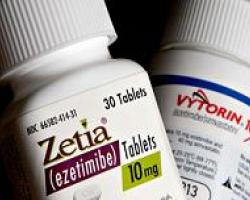With newer knowledge about the process of hardening of the arteries from the ongoing Framingham study it is not surprising that the drug companies are shifting the development of cholesterol-lowering drugs to those substances that will reduce inflammation of the arteries as well. In previous issues of the health newsletter I summarized a paper that was published on the importance of the C-reactive protein (also called CRP) in connection with the diagnosis of heart attacks and strokes. I also reviewed an article that pointed out that both CRP and LDL cholesterol are important in determining who is at risk for developing a heart attack or stroke.
In a press release to Reuters on Nov. 13, 2003 Merck & Co. Inc. and Schering-Plough Corp. announced that ezetimib (Zetia), a new cholesterol-lowering drug that is marketed by both companies, was found by their researchers to lower C-reactive protein (CRP) significantly. At the annual meeting of the American Heart Association in Orlando/Fla. these researchers presented a clinical trial showing that ezetimib when used in combination with small amounts of simvastatin (Zocor) lowered CRP by 33%. However, simvastatin alone lowered CRP only by 14.3%. Dr. Christie Ballantyne, a Baylor College cardiologist, pointed out that this new finding was very important. It was important, because it shows that these drugs do not only lower LDL cholesterol, which according to the Framingham study is a known risk factor for heart attacks and strokes. In addition it has now also been proven to lower CRP significantly at the same time, which is another known inflammatory component produced by the blood vessels also associated with heart attacks and strokes.
Merck and Schering-Plough are now developing a new formulation containing both of these medications as one pill (Vytorin). This has the advantage to lower the risk on liver cells of Zocor by being able to lower the dose in the pill. The Zocor component will mainly lower the LDL cholesterol in the blood (and the CRP somewhat as well) and the Zetia component will provide the beneficial effect of the CRP lowering (anti-inflammatory component and LDL lowering). There is another advantage of this combination: Zetia works by inhibiting absorption of cholesterol by the gut, Zocor works by inhibiting cholesterol synthesis in the liver cells. Whenever the mechanism of action is different two drugs in combination are usually better tolerated than if both would work through the same mechanism. However, the companies pointed out that more research and clinical trials are needed to check out side-effects of Zetia before it would be submitted to the FDA for approval for general prescription by physicians.
P.S. on Oct. 31, 2012: Read the following article about Zetia and Vytorin (the combination pill): http://www.nytimes.com/2008/01/14/business/14cnd-drug.html?_r=0
Links regarding further information about heart disease (Net Health Book).
Last edited December 9, 2012






